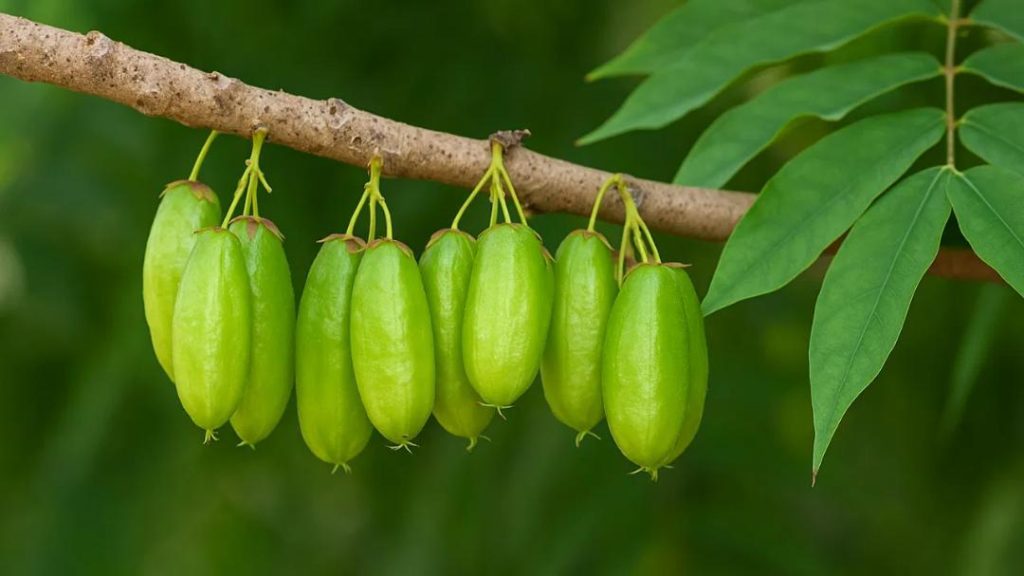
Bilimbi, an Underrated South Indian Fruit Filled with Nutrients
In the lush landscapes of South India, a tangy and lesser-known fruit has been growing in abundance, waiting to be discovered and appreciated. Meet the Bilimbi, also known as the ‘pickle tree’ or ‘Irumban Puli’, a fruit that has been a staple in many South Indian households for generations. Despite its sour taste, Bilimbi is a treasure trove of nutrients and medicinal benefits, making it a superfruit worth exploring.
Native to Southeast Asia, Bilimbi is a small, green fruit that resembles a tiny cucumber. It has a thick, edible skin and a soft, juicy pulp. The fruit is often eaten raw, used in chutneys, or pickled to bring out its unique flavor. However, its underutilization is largely due to a lack of awareness about its numerous health benefits.
Rich in Nutrients
Bilimbi is an excellent source of essential vitamins, minerals, and antioxidants. It is rich in vitamin C, which is crucial for a healthy immune system, and vitamin A, which supports healthy vision, skin, and mucous membranes. The fruit is also a good source of potassium, magnesium, and calcium, making it an excellent option for people looking to manage their blood pressure and maintain strong bones.
One of the most impressive aspects of Bilimbi is its high water content. The fruit is made up of about 92% water, making it an excellent choice for those looking to stay hydrated and support healthy digestion. Additionally, Bilimbi contains a unique combination of flavonoids, phenolic acids, and ascorbic acid, which have been shown to have anti-inflammatory and antioxidant properties.
Medicinal Benefits
For centuries, Bilimbi has been used in traditional medicine in South India to treat a range of ailments. The fruit is believed to have antibacterial, antifungal, and antiviral properties, making it effective in treating infections and diseases. Some of the most common medicinal uses of Bilimbi include:
- Treating fever and body aches: Bilimbi is often used to treat fever, body aches, and general weakness. The fruit is believed to have antipyretic properties, which help to reduce fever and alleviate symptoms.
- Relieving digestive issues: Bilimbi is said to be effective in treating digestive issues such as dysentery, diarrhea, and constipation. The fruit is believed to have anti-inflammatory properties, which help to soothe the digestive tract.
- Treating skin conditions: Bilimbi is often used to treat skin conditions such as acne, eczema, and psoriasis. The fruit is believed to have antioxidant properties, which help to reduce inflammation and promote healthy skin.
Growing and Harvesting
Bilimbi is a relatively easy fruit to grow, making it an excellent option for small-scale farmers and backyard gardeners. The fruit is a deciduous tree that thrives in warm, humid climates with well-drained soil. Bilimbi trees can grow up to 15 feet tall and produce fruit year-round, making it an excellent choice for those looking to have a sustainable and consistent source of fresh produce.
When harvesting Bilimbi, it’s essential to choose fruit that is firm and has a vibrant green color. The fruit should be handled carefully to avoid bruising and damage. Bilimbi can be stored at room temperature for up to 3 days or refrigerated for up to 5 days.
Conclusion
Bilimbi is a unique and underrated fruit that offers a range of nutritional and medicinal benefits. With its tangy flavor and high water content, Bilimbi is an excellent addition to any diet. While it may not be as well-known as other fruits, Bilimbi is definitely worth exploring and incorporating into your daily routine.
By spreading awareness about the benefits of Bilimbi, we can encourage more people to try this incredible fruit and support the farmers who grow it. As we continue to explore the world of superfruits, it’s essential to remember the humble and underappreciated fruits like Bilimbi, which deserve our attention and appreciation.
News Source:






